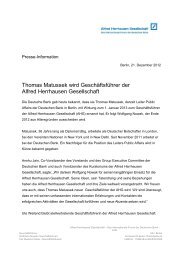India's role in a multi-polar world - Alfred Herrhausen Gesellschaft
India's role in a multi-polar world - Alfred Herrhausen Gesellschaft
India's role in a multi-polar world - Alfred Herrhausen Gesellschaft
Create successful ePaper yourself
Turn your PDF publications into a flip-book with our unique Google optimized e-Paper software.
28<br />
Through a billion voices: India’s <strong>role</strong> <strong>in</strong> a <strong>multi</strong>-<strong>polar</strong> <strong>world</strong><br />
IMF and the GATT/WTO, aimed at conta<strong>in</strong><strong>in</strong>g the<br />
k<strong>in</strong>d of economic and political tensions <strong>in</strong>herent to<br />
the processes of economic transformation brought<br />
about by globalisation. It is therefore worthwhile<br />
to consider how well these <strong>in</strong>stitutions have so far<br />
performed dur<strong>in</strong>g the current wave of globalisation.<br />
The performance of the welfare state<br />
Well before the 2008/2009 f<strong>in</strong>ancial crisis, there were<br />
signs that globalisation was threaten<strong>in</strong>g the welfare<br />
state <strong>in</strong>stitutions enacted <strong>in</strong> the west after WWII. At<br />
the turn of the century it was clear that opposition<br />
to globalisation was gather<strong>in</strong>g pace with<strong>in</strong> labour<br />
movements on both sides of the Atlantic.<br />
In the US, where markets operate more efficiently,<br />
globalisation generated more wealth, but also more<br />
<strong>in</strong>come <strong>in</strong>equality and adjustment problems than<br />
<strong>in</strong> Europe. The US median voter lost wages and<br />
experienced ris<strong>in</strong>g job <strong>in</strong>security, both of which<br />
resulted <strong>in</strong> fierce opposition to <strong>in</strong>creased globalisation.<br />
In Europe, where the welfare state is more generous<br />
and markets are less efficient, globalisation generated<br />
less wealth, but also less <strong>in</strong>come <strong>in</strong>equality and<br />
adjustment problems than <strong>in</strong> the United States. The<br />
European median voter <strong>in</strong> fact suffered relatively<br />
little; unemployment had <strong>in</strong>creased, but its effect fell<br />
ma<strong>in</strong>ly on labour market outsiders: the young and the<br />
immigrants. Accord<strong>in</strong>gly, European organised labour<br />
voiced less opposition aga<strong>in</strong>st globalisation than <strong>in</strong><br />
America. An important question, at the time, was<br />
whether these responses could be susta<strong>in</strong>ed <strong>in</strong> the<br />
face of major challenges.<br />
The advent of the global crisis <strong>in</strong> 2008/2009 <strong>in</strong>deed<br />
delivered a significant and abrupt challenge to the<br />
situation of the median voter <strong>in</strong> America and the<br />
susta<strong>in</strong>ability of the welfare state <strong>in</strong> Europe.<br />
In Europe, before the crisis, there existed four types<br />
Institutional imbalances: can globalisation be susta<strong>in</strong>ed? | André Sapir<br />
of social model, each with a different comb<strong>in</strong>ation of<br />
efficiency and equity: a Mediterranean model, which is<br />
neither efficient nor equitable; an Anglo-Saxon model,<br />
which is efficient but not equitable; a Cont<strong>in</strong>ental<br />
model, which is equitable but not efficient; and a<br />
Nordic model, which is both efficient and equitable. 1<br />
Given the tumultuous effects on markets and<br />
spiral<strong>in</strong>g public debt figures <strong>in</strong>duced by the crisis, it<br />
is now clear that the Cont<strong>in</strong>ental and Mediterranean<br />
models, unsusta<strong>in</strong>able even before the crisis set <strong>in</strong>,<br />
are <strong>in</strong> dire straits. Furthermore, debts have sharply<br />
<strong>in</strong>creased <strong>in</strong> the previously low <strong>in</strong>debted countries<br />
belong<strong>in</strong>g to the Anglo-Saxon model, render<strong>in</strong>g them<br />
unsusta<strong>in</strong>able. This leaves the Nordic model as the<br />
only one <strong>in</strong> Europe capable of handl<strong>in</strong>g economic and<br />
social changes <strong>in</strong> a susta<strong>in</strong>able manner.<br />
In the US, the effects of the crisis had severe impacts<br />
on <strong>in</strong>come distribution, poverty and unemployment<br />
levels giv<strong>in</strong>g rise to a situation which is bound to<br />
result <strong>in</strong> <strong>in</strong>creas<strong>in</strong>g protectionist pressures, targeted<br />
especially aga<strong>in</strong>st emerg<strong>in</strong>g countries.<br />
The performance of global governance<br />
There were also signs, before the f<strong>in</strong>ancial crisis, that<br />
globalisation was threaten<strong>in</strong>g the global governance<br />
system put <strong>in</strong> place after WWII. 2 By the early 2000s,<br />
the global economy had little <strong>in</strong> common with that of<br />
only 20 years earlier when a collection of <strong>in</strong>tegrat<strong>in</strong>g,<br />
but still highly segmented national economies coexisted<br />
with quasi-autarkic blocks (Ch<strong>in</strong>a, India, the<br />
Soviet Union and its satellites) represent<strong>in</strong>g about<br />
half the <strong>world</strong> population. Yet, the global economic<br />
governance regime – the set of global rules that<br />
govern <strong>in</strong>ternational economic relations, the network<br />
of <strong>in</strong>stitutions that support and enforce those relations<br />
and the processes that steer change <strong>in</strong> this system<br />
– had not undergone a parallel transformation. Some<br />
1 Sapir, André (2006). “Globalization and the Reform of European Socials Models”. Journal of Common Market Studies, Volume 44.2.<br />
2 Sapir, André (2001). “Who’s Afraid of Globalization? Domestic Adjustment <strong>in</strong> Europe and America”. In Roger B. Porter, Pierre Sauvé, Arv<strong>in</strong>d Subramanian<br />
and Americo B. Zampetti (eds.), Efficiency, Equity, and Legitimacy: The Multilateral Trad<strong>in</strong>g System at the Millennium, Harvard University and Brook<strong>in</strong>gs<br />
Institution Press: Boston and Wash<strong>in</strong>gton, DC.








